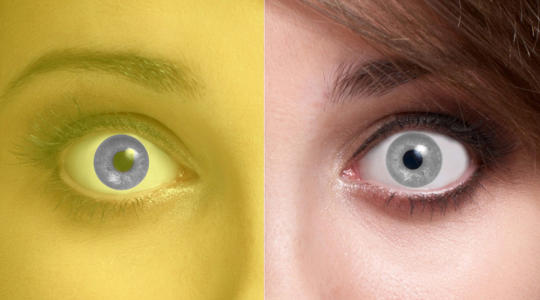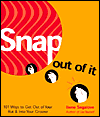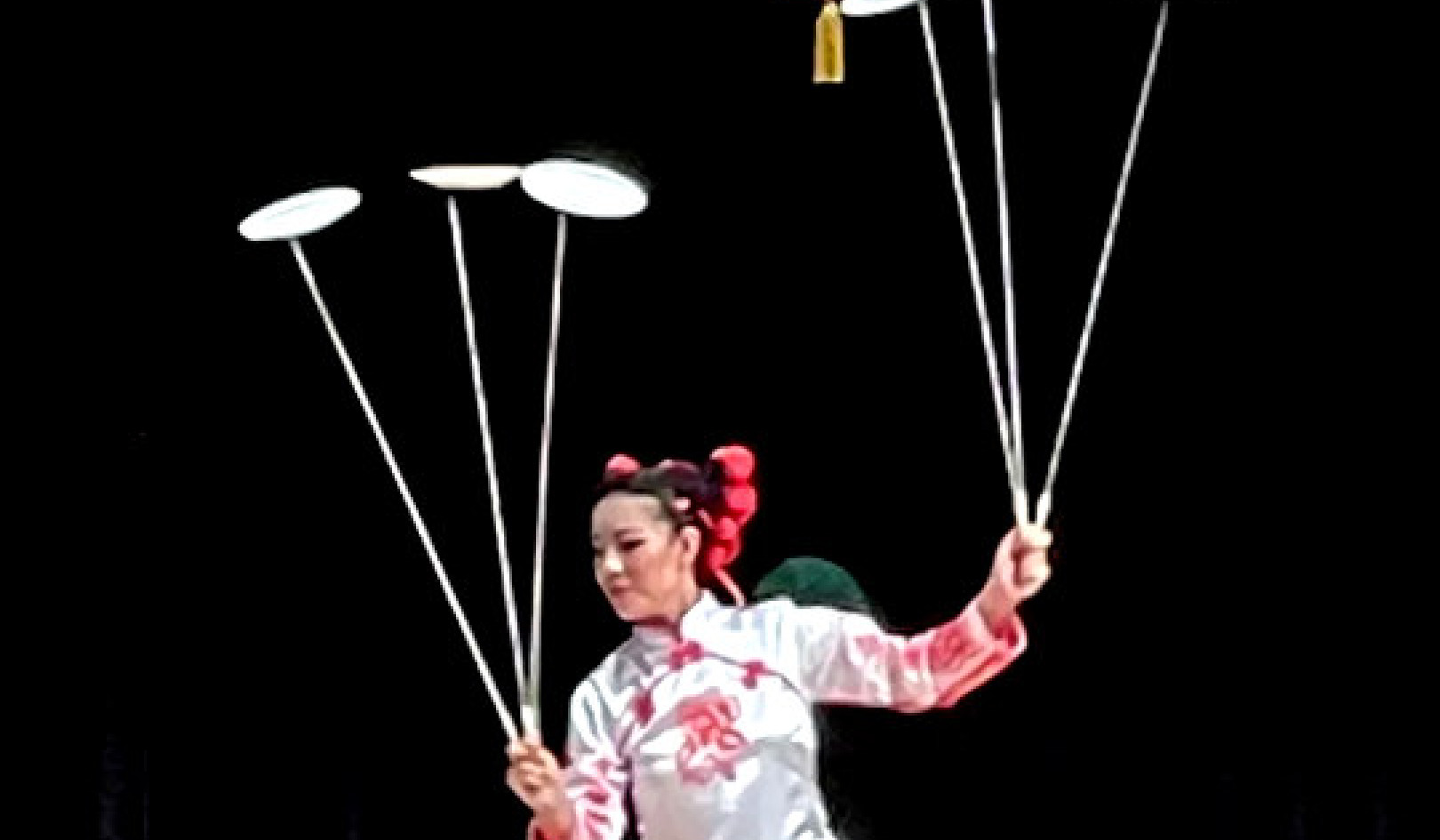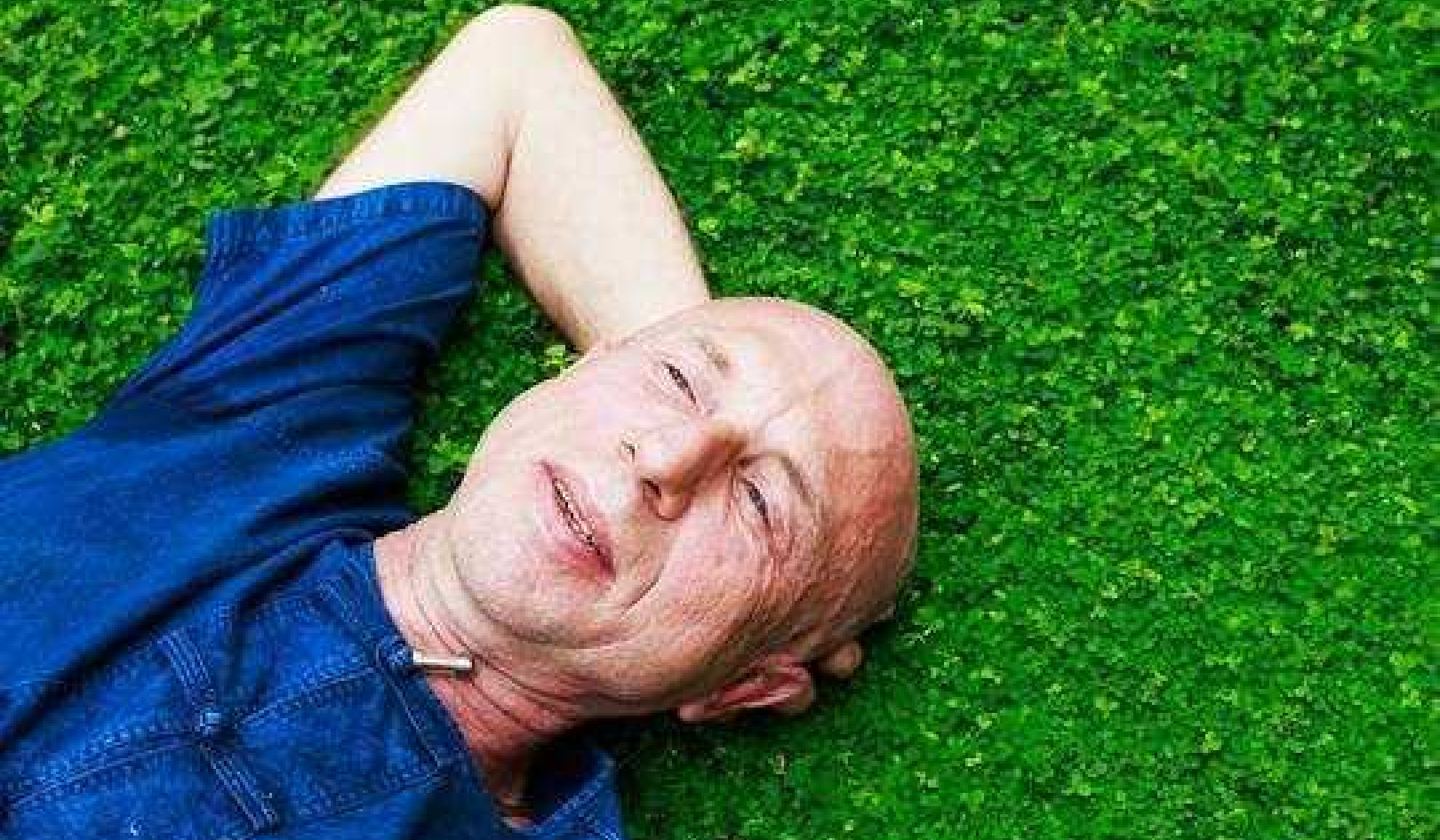
Humans are creatures of habit, and sometimes we get stuck in a rut. We can't step outside of our usual behavior, even when we know it's necessary for our mental health.
Sometimes we're overwhelmed. We face a simple daily task and spin into panic or just plain freeze. We become spinners and wind ourselves into a tizzy or become zombies and space out in a stupor. Neither opens up our hearts or minds to the real challenges or pleasures at hand. We need to snap out of it and get back into living again. But how?
How many hours a day are you lost in a stupor or caught up in anxiety? Maybe it's time for you to break a habit, jump out of a pattern, and simply clean out your cobwebs instead of sweeping them under the rug. Maybe it's time for you to just snap out of it. Snap out of the "it" of being less than whole, fragmented, urgent, crazy, dull -- zipping from one extreme to the other, not feeling right, not being your best self.
It's amazing how good it feels to drive out of the garage after an oil change and tube. The car runs a little more smoothly and feels a whole lot more responsive. We deserve the same kind of care. Just like cars, we humans need regular tune-ups.
Two Basic Profiles: Yin and Yang
Eastern thinking divides human behavior into two basic energetic profiles -- yin and yang. Yin is a state of quiet receptiveness, filled with potential. Yang is the opposite style, filled with activity, busyness, and outward expression. Personal experience reflects a continual dance between the two ways of being. Most of us find ourselves inhabiting one state more than the other.
Zombies live in extreme yin. They handle life and its stresses by zoning out, getting dazed, spaced, or even paralyzed. Spinners live in extreme yang. They flip into manic obsession, are uptight, anxious, pent up, and overloaded. Zombies tend to run from life -- that's called flight. Spinners tend to lash out at life -- that's called fight.
Our systems cannot tolerate either state for long before screaming, "Get yourself out of here!" Neither lethargy nor anxiety allows us to make good choices or enjoy ourselves. Both beg us, "Snap out of it!"
Are You a Zombie or a Spinner?
Review the following keywords -- anything sound familiar?
Zombie: Stupor. Lethargy. Spaced. Frozen. Fear. Paralyzed. Depressed. Down. Unable to feel or care. Quiet. Internal. Flight. Loose and shapeless. Wants to disappear. Needs to activate.
Spinner: Manic. Anxious. Nervous. Overwhelmed. Obsessive. Predatory. Spun out. Up. Loud. External. Fight. Panic. Tightly wound. Unable to focus or manifest. Wants to explode. Needs to relax.
Roadmaps of Living
Humans are billions of individual cells arranged in an infinite array of different patterns that organize themselves into our very unique being. Your hand is a set of patterns. So are your liver and your uvula. Your brain also expresses itself as different patterns. It creates its own set of networks in response to stimuli and repeated actions.
Networks are neural off-ramps onto ways of doing and being. When we use these off-ramps over and over again, we fall into habit. Our most habitual roadmaps become etched in our brain circuitry and become guidelines for our behavior.
Yet the brain is considered a plastic medium. It can change shape, and does. Adult brains refashion themselves according to the demands of the owner. It's like we're all the heads of our own department of roadwork -- if we want to stop traveling the same old Main Street over and over again, we need to build new freeways and bridges and tunnels.
Creatures of Habit
Of course, many of our habits are so ingrained we fail to recognize how robotic we have become. It's all autopilot. On one hand, it's great -- how wonderful that we don't have to concentrate on walking as our legs habitually carry us across the room. But on the other hand, if we succumb to this robotic behavior, our ingenuity becomes sluggish, almost knee-jerk, and we deny ourselves so many options.
There's an old Spanish proverb: "Habits at first are like silken threads. Then they become cables." It's important to develop rituals and routines to make life flow. But when routines turn into ruts, or tie us down, we need help getting out.
Fight or Flight
Getting stuck is a form of stress and stress is a reaction to a perceived threatening situation. When anything tips the scale toward threat, we humans automatically flip into fight or flight. Our body is hardwired to either fight (Spinners) or flee (Zombies).
We don't even need to experience big or real danger. If we just think about an emotional or physical threat, all kinds of powerful bodily reactions kick in. Our heart beats faster. Our breathing rate and blood pressure increases. Our hands and feet become cooler to shunt blood from the extremities to the big muscles so that we can fight or run with some success. Even the pupils in our eyes dilate so we can see better.
The reptilian brain, the oldest part of our brain, spends most of its time asking, "Am I safe?" Our lives are no longer in constant peril, but most of us are consistently on the lookout while casually reading a book, sipping tea, or balancing our checkbook. We may perceive a serious threat while simply sitting silently at our desks. Maybe we get a nasty e-mail from someone we don't like.
Those forty little electronic words can blast our systems into active red alert. Our ancient soul screams "Danger!" We become a house divided. Running on automatic, we flip into manic and start pacing and sweating (Spinners). Or maybe we space out, freeze and go numb (Zombies). There's no visible monster in sight, but, again, that doesn't seem to matter. This isn't about what makes sense. This is core. This is survival!
Fight or flight puts us through some serious paces. Since our bodies house vital electrical and chemical systems that percolate day and night, there's bound to be a lot of action. Our brains are filled with busy circuits housing thousands upon thousands of signals. But just like cell phone switching stations, our internal switchers can become jammed or confused, especially when we're on red alert. This is a key moment. We all know when we're starting to spin or space. A red alert means, "Snap out of it."
What Do I Do Now?
If you've ever had a dog you know the feeling you get when you see him spinning in circles as he chases his tail. At first it is amusing. But as he spins and spins and seems to be digging a hole deep into the carpet you start to worry. He may not stop. You recognize he's in some kind of ancient genetic loop. You feel the need to intervene. You offer him a ball or a cookie. You try to distract him. Or you yell loudly, "Stop it!" hoping you can scare him out of his stupor. Once he stops, he may look at you like, "What the heck was I doing? Phew. Thanks."
When habit has gotten you by the tail, stop spinning, and find your way back into life again.
I come from years of feeling the pressure of time. My parents were both avid clock-watchers. They spent most of the day getting direction from their matching Timex wristwatches. We lived in a combustible, if imaginary, 9-1-1 world. As I got older, I embodied emergency room behavior. I was my own sergeant, shouting directions, ordering myself around. Whether I was cooking or gardening or even taking a bath, I got these weird urges to rush. Quick, sauté those onions! Quick, pull those weeds! Quick, wash your face! Anxious and pooped out, I found myself often disconnected from enjoying or even engaging in the task at hand.
When I get stuck, I need a break. I need to remember I'm safe. And I need to admit I'm falling into habit again. I may pace, drink coffee, make some phone calls, even vacuum. But if nothing snaps me out of it, what do I do? I check right into a favorite activity. I extend my arms and gaze upward. I like to repeat out loud, "It's all okay. I'm doing the best I can," instead of a conventional prayer. Immediately I sense a real change.
Conscious movement is groundbreaking. First, I'm taking a moment to snap out of it. I'm not pushing the red alert sign away, but I'm handling it in my own way. I know there is nothing to run away from or to fight. The alarm system is teaching me something more. It's reminding me I have a choice!
One day I found myself skimming the newspaper and starting to feel deeply uneasy. Instead of surrendering to depression and taking a nap I snapped out of it by trying out Wild Hoots (Activity: Make as many animal sounds as you can. It might take a little while to loosen up but go for it. Roar like a lion. Hoot, holler, and whistle like exotic birds. Open your teeth. Click, clack, cackle. Don't forget favorite barnyard animals. When in doubt, snort like a pig. Everyone can do that one!).
I started to growl like a tiger. Then, since I felt like a caged animal, I acted like one and paced in my make-believe cage. After a few minutes I moved some static energy, felt much better, wiggled and growled, and then nestled back into my chair. I found myself paying attention, at last.
Refocused and refreshed, I realized I had probably just looked and sounded pretty crazy. But had I lost my mind? Not really. I actually found it. I snapped out of my basic ancient brain and got current and conscious at last.
Let's say you're writing on the computer (or reading, or working out a math problem) and you get stuck. Break out of your stupor. Get out of your trance. Bust the spell of tired old patterns. Interrupt the humdrum. Turn off the automatic pilot and shape-shift into a new point of view. Shine brighter. Feel lighter. Expand your vistas. Sigh. Laugh. Relax. Rejoice. Know you have a choice.
Reconnect to life again simply by taking a break. Look out the window. Listen to the wind. Sing a song. Make your mark. Twist and shout. And put your genie in a bigger bottle!
Put your Genie in a Bigger Bottle
I overheard a conversation on a flight from Atlanta to Los Angeles. It was between a magician and a chemist. The chemist said he had concocted a formula that successfully cleaned all surfaces, real or synthetic. The magician said, "So you're an alchemist."
The chemist said, "No."
The magician pulled a coin from behind the chemist's ear. "Now you say you clean all surfaces, both real and unreal. And you say you brew potions in a laboratory. Sounds like magic to me."
The chemist got nervous. "That's not magic. I'm essentially a businessman. Just like you. We're all trying to make a living. Nothing more." The chemist frantically dug into his briefcase and pulled out a Walkman, headphones, and a Palm Pilot. He plugged in as a glazed look filled his eyes and instantly zoned out.
"You are not listening to me," the magician insisted. He leaned into the chemist's left ear and whispered, "Put your genie in a bigger bottle."
The chemist pulled off his headphones. "What?"
"Unplug yourself. Crack yourself open. And snap out of it. You'll be amazed to discover who you really are."
"Hocus pocus," the chemist sneered. "Abracadabra," the magician announced. "Open sesame," I chimed in.
And then there was a crackling sound and the pilot announced, "Just a simple electrical failure, folks. Nothing to worry about. We'll get things shipshape in no time." The headsets went dead, the movie had frozen, and the reading lamps fizzled out. Everyone squirmed in their seats as the scent of fear and disconnect floated down the aisles.
I gazed over at the chemist. Somehow, in the darkness, his face transformed from anxiety to delight. It was as if the power failure snapped him out of the prison of habit into a place of choice. It was remarkable how totally different he seemed, like Pinocchio when he transformed from wooden puppet to real boy. He came alive, leaped up, and patted the magician on the back. The magician laughed loudly and then the two of them, as though led by a shared but silent call, walked over to a window and eagerly gazed out at the vast and perfectly blue sky.
Reprinted with permission of the publisher,
Red Wheel/Weiser, LLC. ©2004.
www.redwheelweiser.com
Article Source
Snap Out Of It: 101 Ways to Get Out of Your Rut & into Your Groove
by Ilene Segalove. Snap Out of It offers 101 snappy ways readers can get their creative groove back. Artist Ilene Segalove shows how simply exploring the realm of our senses can unleash undreamed of creative powers from the chains of habit and routine. Snap Out of It "snaps" us back into paying attention to our lives by using our senses to get at a deeper, more exciting reality. In addition to longer, more involved sensory activities, Segalove offers "Quick Snaps" that anyone can do on the fly to shake things up a little.
Snap Out of It offers 101 snappy ways readers can get their creative groove back. Artist Ilene Segalove shows how simply exploring the realm of our senses can unleash undreamed of creative powers from the chains of habit and routine. Snap Out of It "snaps" us back into paying attention to our lives by using our senses to get at a deeper, more exciting reality. In addition to longer, more involved sensory activities, Segalove offers "Quick Snaps" that anyone can do on the fly to shake things up a little.
Info/Order this book.
About the Author
 ILENE SEGALOVE is an internationally known multi-media artist, a contributor to National Public Radio, and the author of fourteen books, including the best-selling List Your Self and its sequel, More List Your Self. Ilene is the co-founder of Tools with Heart.
ILENE SEGALOVE is an internationally known multi-media artist, a contributor to National Public Radio, and the author of fourteen books, including the best-selling List Your Self and its sequel, More List Your Self. Ilene is the co-founder of Tools with Heart.






















